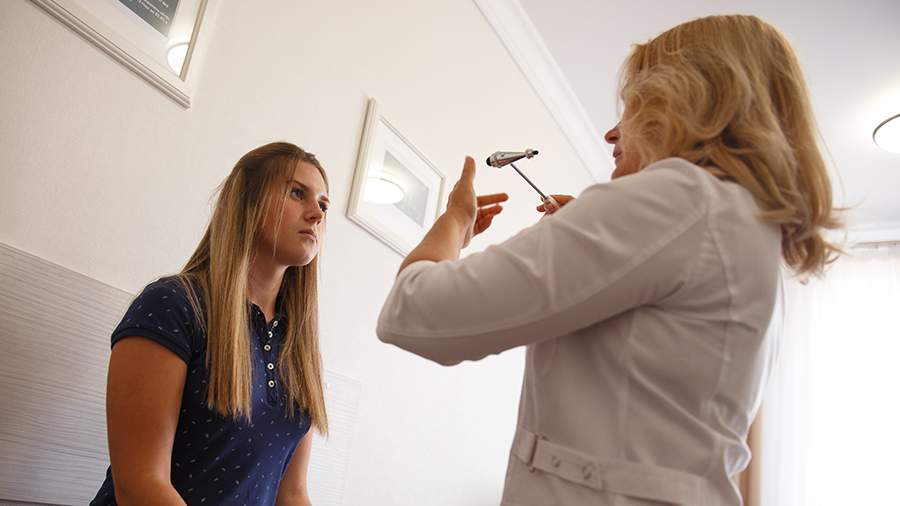The neurologist told about non-standard manifestations of epilepsy
It is widely believed that epilepsy is manifested by loss of consciousness, seizures, and salivation. Polina Lepilova, a neurologist at the Sberbank Health medical company, told Izvestia about what an attack might look like and how to properly help a person at this moment. Epilepsy Day is celebrated annually on March 26 in the world.
"Epilepsy is a widespread chronic neurological disease. According to the World Health Organization, approximately 50 million people have it. Epilepsy occurs due to abnormal activity of brain neurons and is characterized by repeated spontaneous seizures," she said.
Seizures can be focal or generalized. The first may occur due to abnormal activity of nerve cells in one area of the brain with or without loss of consciousness in humans. Symptoms of a focal seizure without impaired consciousness can be motor manifestations: muscle twitching, cramps in one part of the body, for example, an arm or leg; sensory — tingling or numbness of the skin, flashes of light in front of the eyes, strange smells or tastes; mental — a feeling of fear, euphoria.
If the seizure is accompanied by a violation of consciousness, then the person may look detached or confused, stops answering questions and contacting, and after it may not remember what happened. Automatisms also sometimes occur — repetitive movements such as smacking lips, chewing, walking in circles, and aimless hand movements.
"Generalized seizures affect both hemispheres of the brain and are often accompanied by loss of consciousness. They can manifest themselves in different ways, for example, loss of consciousness and rhythmic tension and muscle relaxation; short—term loss of consciousness - about 5-10 seconds, during which the patient freezes, does not respond to external stimuli, and then returns to normal activity without remembering this episode; short and sharp twitches of the muscles of the arms or legs that occur sometimes in series," the specialist explained.
To diagnose epilepsy, it is necessary to consult a neurologist. It is important to describe the attack in detail, for example, from the words of eyewitnesses, or to show a video of the seizure recorded by them, as well as to tell if close relatives have this disease.
"Antiepileptic drugs are used as a treatment for epilepsy. Usually, therapy begins with one drug, but a combination of them may be recommended. It is especially important to note that antiepileptic drugs must be taken constantly and without interruptions to reduce the risk of a seizure. In the absence of a clinical effect from conservative therapy, surgical treatment may be prescribed," Lepilova noted.
According to her, vaccination against neuroinfections, for example, from meningococcus, is important as a prevention of epilepsy. You should also avoid triggers such as flashing lights, lack of sleep, and abstaining from alcoholic beverages. To help a person who has an attack with seizures and impaired consciousness, you need to follow several rules. First, you need to put him on his side and put something soft under his head, such as a pillow or clothes. It is also important to make sure that there are no sharp objects nearby. You also need to time the attack, and if it lasts more than five minutes, then you need to call an ambulance.
You should not restrain a person's movements and put a spoon or other objects in your mouth during an attack. This is dangerous and can lead to injury to the teeth or cause aspiration — ingestion of foreign bodies into the respiratory tract. You can also not perform artificial respiration if there is no cardiac arrest, give water or medicine.
"Many people think that epilepsy is a hereditary disease, but only 30% of cases are related to genetics. Another misconception is that the disease is incurable, but 70% of patients with epilepsy achieve remission during therapy. It is also important to note that when taking medications and controlling seizures, most patients lead a normal life, including pregnancy, under the supervision of a doctor," the specialist concluded.
Earlier, on March 17, Olga Ulankina, an expert at the Hemotest laboratory, told Izvestia that the symptoms of poisoning with counterfeit medicines can vary from nausea to severe neurological disorders: seizures, confusion, respiratory depression and heart function. Kidney and liver damage is also possible.
Переведено сервисом «Яндекс Переводчик»


